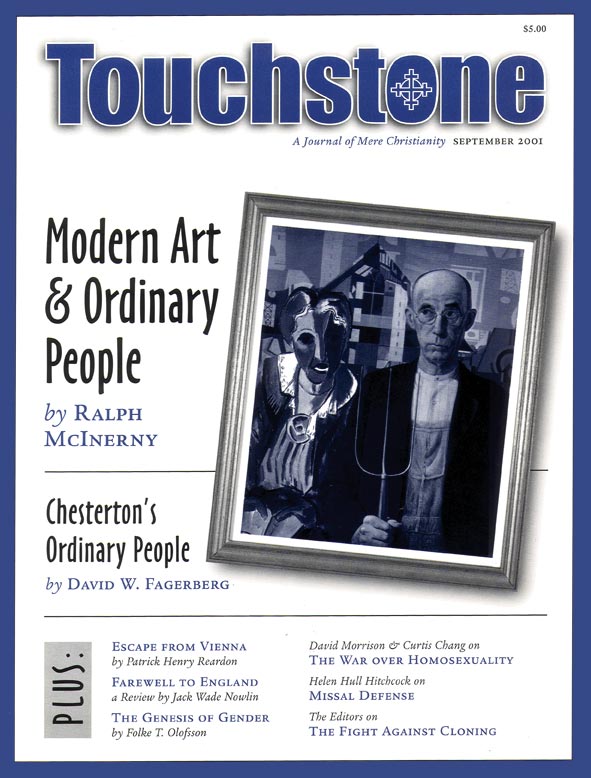Escape from Vienna
Critical Reflections on a Lingering Confinement
by Patrick Henry Reardon
Until very recently I taught several divisions of the basic “Introduction to Philosophy” college course every semester, including summers, for ten years, and I am convinced that the average incoming college student is a thoroughgoing Logical Positivist. That is to say, he is persuaded that the only things he can know for certain are either objects available to his senses or matters under the control of his reason. Consequently, when I explain to him the meaning of Logical Positivism, he immediately recognizes it as the scientific disciplinary system he learned in his high-school science courses. This comes as no surprise, for I have not the slightest doubt that the “working philosophy” of the average high-school science teacher is still burdened by the inadequate epistemology of the Logical Positivists, whether he knows it or not.
Logical Positivism is a school of philosophy (really, a philosophy of science) that owes its origin to a group of Austrian thinkers, known as the Vienna Circle, in the early and mid-twentieth century. It is also a school of thought that the academic community itself has already rejected and that relatively few folks nowadays could even identify by name. The Vienna Circle may as well be a racetrack, as far as most people know.
Why, then, should I beat a horse whose death certificate the veterinarian, some time ago, already signed? Because reports of the old nag’s death are greatly exaggerated, and she is in fact yet running around here and there, and a lot of betters are still laying their money on her. Since some of these betters today even include Christian apologists, I propose to undertake a description and critique of Logical Positivism in the interests of helping us see its dangers and its confinement.
Logical Positivism Described
During much of the twentieth century, the philosophy of science in the United States was dominated by members and disciples of the Vienna Circle. Among their names are Kurt Gödel, Otto Neurath, Moritz Schlick, and Friedrich Waismann. Worthy of more special mention are Herbert Feigl (1902–1988) and Rudolph Carnap (1891–1970), inasmuch as these two, in the 1930s, immigrated to this country and began their very successful careers as authors and college professors. They and their graduate students in philosophy, many of whom followed them in teaching the philosophy of science in major universities throughout the United States, are to be counted among the major influences on the academic development of the sciences in this country. Since he wrote directly in English, the name of A. J. Ayer should be added to theirs as a fellow traveler of the Vienna Circle; his seminal work, Language, Truth, and Logic was published in 1936.
The proper task of philosophy, according to Logical Positivism, is epistemological—to establish the conditions of certainty. How, these men asked, can the mind become certain of the truth or falsehood of any given proposition? The very name “Logical Positivism” indicates their answer to the question, for it testifies to the two components of this philosophy’s methodology. The word positivism refers to the process of gathering empirical data, the investigation and critical assessment of sense knowledge. This is what Feigl calls “material science.” The word logical, on the other hand, refers to the organization of that empirical data by means of theorem and formal logic. This is what Feigl calls “formal science.”
Their answer to the question—How can the mind become certain of the truth or falsehood of any given proposition?—is that there are only two ways: either by the convincing accumulation of empirical knowledge, and/or the application of a valid rational inference.
Moreover, for the proper governing of this philosophy of science, the Logical Positivists recognized two “principles,” as they called them, the principle of intersubjectivity and the principle of verification. Both of these need to be examined in detail.
First, the principle of intersubjectivity means that, in the pursuit of “cognitive meaning” (Carnap’s expression), one may never appeal to a source of knowledge that is not universally available. We may think of this as a kind of democratic principle. It simply insists that each human mind, because it has the same structure, composition, heuristic processes, and logical procedures as every other human mind, must have equal access to exactly the same cognitive meaning. Thus, it is not legitimate for a person to appeal to some special heuristic or cognitive process not universally available. An obvious example of the latter would be an appeal to special revelation, which happens to be a distinguishing characteristic of the great Western religions. Thus, for instance, it is on the basis of this principle of intersubjectivity that scientists and others have opposed any introduction of religious doctrine or presupposition into the teaching of science in our public school systems.
Patrick Henry Reardon is pastor emeritus of All Saints Antiochian Orthodox Church in Chicago, Illinois, and the author of numerous books, including, most recently, Out of Step with God: Orthodox Christian Reflections on the Book of Numbers (Ancient Faith Publishing, 2019).
subscription options
Order
Print/Online Subscription

Get six issues (one year) of Touchstone PLUS full online access including pdf downloads for only $39.95. That's only $3.34 per month!
Order
Online Only
Subscription

Get a one-year full-access subscription to the Touchstone online archives for only $19.95. That's only $1.66 per month!
bulk subscriptions
Order Touchstone subscriptions in bulk and save $10 per sub! Each subscription includes 6 issues of Touchstone plus full online access to touchstonemag.com—including archives, videos, and pdf downloads of recent issues for only $29.95 each! Great for churches or study groups.
Transactions will be processed on a secure server.
more from the online archives
calling all readers
Please Donate
"There are magazines worth reading but few worth saving . . . Touchstone is just such a magazine."
—Alice von Hildebrand
"Here we do not concede one square millimeter of territory to falsehood, folly, contemporary sentimentality, or fashion. We speak the truth, and let God be our judge. . . . Touchstone is the one committedly Christian conservative journal."
—Anthony Esolen, Touchstone senior editor









